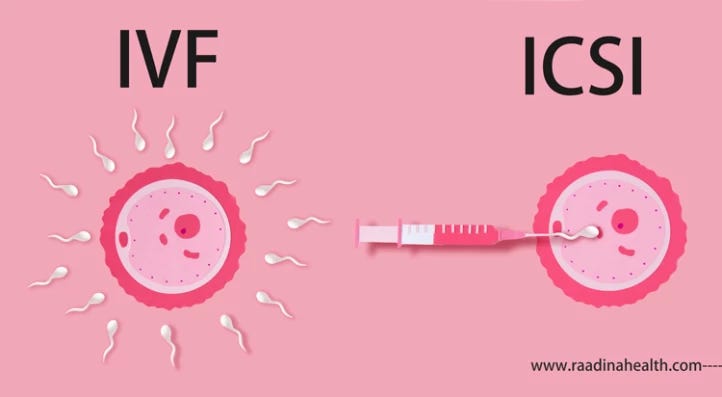In-Vitro Fertilization: Safe & Effective?
Not exactly.

Fertility
Whether you want to observe this from a societal, spiritual, or evolutionary lens it is clear that reproduction of healthy offspring is one of the most important (if not the most) things a human can do.
There are decades of physiologic development, personal growth and mate selection which intersect for the purpose of successful conception and rearing of offspring.
There are few perspectives which I refuse to entertain, and anti-natalism is one of them. But, that doesn’t mean we can ignore the aspects of our lives and environment which fulfill the anti-natalist agenda. I am, of course, referring to factors which lead to infertility.
Unfortunately, rates of infertility continue to rise. Some trends demonstrate that western developed nations have gone from low single-digit (~4%) rates of infertility to double-digit (12-15%) over the last several decades.
Everyone from the mainstream media and your doctors will “hmm” and “haww” about the causes of infertility - often conveniently ignoring the elephants in the room.
For starters, we can think of fertility is a multi-phase event. From my perspective, fertility is not just the ability to get pregnant. Although having sperm and eggs which are capable of fertilizing is critically important, the ultimate goal is to birth thriving and vibrant offspring.
What use is it to call yourself “fertile” if you give birth to children with disease? In many societies of the past (and maybe even some in the present), diseased children were less than welcome.
Therefore, we can think of a person (or a couple) as “fertile” when:
They can get pregnant
Carry the pregnancy to term
Minimal-to-zero pregnancy-related health concerns (e.g. gestational diabetes)
low-risk & successful spontaneous delivery
Infant born without deformity or disease
Normal development (e.g. absence of developmental disorders)
In my opinion, if you check all of these items - then you have a truly and completely fertile coupling.
Solving Infertility
Fertility medicine has been in vogue for many decades.
Unfortunately, despite the doctor’s best efforts to solve infertility…rates of infertility continue to rise.
Similar to how rates of chronic metabolic diseases continue to rise, despite the “gold-standard” and “evidence-based” approach that has been perpetuated in the medical field for decades.
Not only do these diseases continue to rise, but so do their long-term complications.
One of the cornerstones of “fertility medicine” is assisted reproductive technologies, which have been in use since the 1970s. It is estimated that the US has anywhere between 5-8 million people that were born from these techniques.
These technologies include things like: artificial insemination (AI), in-vitro fertilization (IVF), and intracytoplasmic sperm injections (ICSI).
The above diagram illustrates the difference between IVF and ICSI. With IVF, sperm are placed near the egg in a ‘harmless’ environment (e.g. petri dish). With ICSI, the sperm are injected into the egg.
Imagine dealing with sperm that are so incompetent that they must be forcefully injected into the egg.
It would be like your “fertility doctor” guiding the male genital into the female - you know, to aid in reproduction. Incompetence at every scale. As with the man, so with the sperm.
For simplicity, I will generally be referring to these techniques as IVF. But, keep in mind that each of these approaches seeks to overcome incrementally higher short-comings of the couple who wish to conceive. In my opinion, ICSI is probably the worst-case scenario. This is used in cases in which the female physiologic environment is unwelcoming of pregnancy, and/or the sperm are so incompetent that they cannot fertilize an egg on their own (whether in the female or in a petri dish).
The Problem With IVF
Let’s take a moment to appreciate conception.
Under normal circumstances, if your body encounters a foreign antigen or life-form, it will mount an immune response. Rapidly mobilizes its soldiers to contain and expel the invader.
Conception is fascinating because the female reproductive organs have a dual task.
On the one hand, the ability to keep foreign entities out must be maintained. Otherwise, a female would frequently experience infections of their vaginal canal and uterus.
Furthermore, the same defensive mechanisms are adapted to filter out bad sperm. That is to say, the female reproductive organs must have standards. Not just any old sperm will be allowed to make its way to the egg. They want robust, energetic and healthy sperm - for obvious reasons.
On the other hand, once the chosen sperm makes its way to the egg…the environment must be so welcoming and open, that the two life-forms must be permitted to fuse.
No longer are we discussing an environment of defense, but an environment of complete and utter acceptance of whatever makes its way through the proverbial door (in this case, the cervix).
This dichotomy is what makes fertility complicated and difficult.
If you do not take proper care of the reproductive organs (both inside and outside the uterus), your overall health, and the health of your selected mate (and his sperm)…then, you may not be able to conceive.
And, that’s okay.
The body is talking to us. We need only listen.
What we shouldn’t do is force the body to take on a pregnancy when it isn’t ready or doesn’t want to. This may sound a bit callous or harsh - so be it.
I cannot have a six-pack just because I want one. I have to work for it.
Nor, should I be able to force a pregnancy if me or my partner are inadequately prepared for it.
Which brings us to the real problem with IVF.
What do you think will happen when you force a woman to take on a pregnancy when her body (and probably mind and spirit) are not ready for it?
By now, we have some data to shed light on this question. Since the first IVF conceived baby was born in 1978, there are many cases we can study.
At the time of the above article (2009), data was less abundant…but, even at that time patterns began to emerge.
For instance, the authors report higher rates of premature birth and low-birth weight infants in IVF groups. They also report higher rates of birth complications, and increased risk of congenital malformations.
Already, we see evidence of harm to the baby and the mother - which is not surprising.
This article from 2017 discusses newer research suggesting that children born of IVF have higher risk of chronic disease such as obesity, type 2 diabetes, and cardiovascular disease.
Most recently, we have this study from the European Heart Journal with a very telling finding. Quote:
This large population-based cohort study of 7.7 million live-born children, including 171 735 children born after [IVF], showed a higher risk of major congenital heart defects in children born after [IVF] compared with children born after spontaneous conception.

This study has a lot of data, but some interesting patterns emerge.
For instance, those who were born after multiple IVF attempts had much higher risk than those born from a single IVF attempt. This, I believe, is related to the readiness of the female to carry a pregnancy to term. A finding also true of spontaneous conception.
It isn’t the IVF specifically that’s the cause for alarm, but the readiness of the female (and the health of the sperm) to carry a healthy pregnancy. Almost all of the studies I have reviewed also mention this as a possible factor - to their credit.
I believe this is only the beginning.
As the world continues along the current trend of disease, disorder and distress…both the need and financial motivation towards IVF techniques will increase.
With it, we will continue to see increases in the types of complications discussed above.
Conception is Hard.
As it should be.
Even for those who have been blessed with spontaneous conception, it is worth noting that many of the problems encountered by IVF babies are also encountered in babies who were conceived after multiple attempts, further emphasizing that it isn’t merely IVF that is the problem.
True fertility medicine is one of the most difficult intersections of the field. The humans (especially the woman) have to be balanced/optimized in so many dimensions to minimize the risk of perinatal and long-term complications.
These health considerations include, but are not limited to:
Hormonal balance
Diet
Fitness
Body composition
Sleep hygiene
Environmental toxins
For example, I bet you didn’t know that polyester underwear can cause infertility. Quicker and easier than you had probably expected.
In both males and females.








This was interesting. Happy to report that I have naturally produced six healthy children, even being overweight at the time, but giving birth with as little medical interference as possible. Three of them born at home, which was super. Only regret is that I let the midwife clamp and cut the cord to soon, which stops the pulsation of blood and deprived the child of about 1/3 of blood that is still in the placenta after birth. And I regret vaccinations, which caused the first three fever convulsion several times before the age of two. But at least we have no allergies or other troubles, that is common nowadays.
Great article. IVF never seemed right to me but couldn't put my finger on why. This makes sense. The body / spirit is literally not ready / not equipped to take on the project.